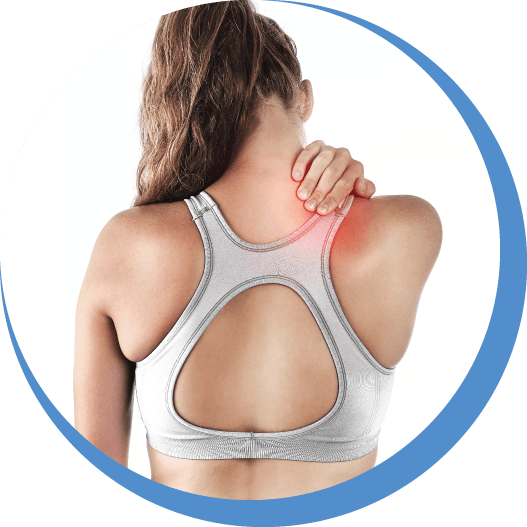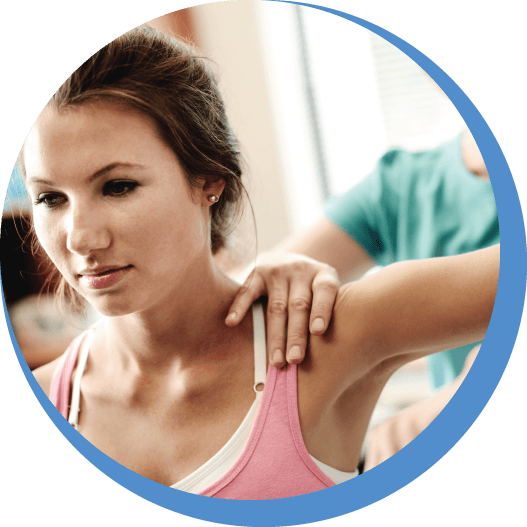Shoulder Pain
Symptoms of shoulder pain
- Pain is dull, achy sharp or severe
- Onset is gradual or sudden
- Triggered or worsened by everyday activities, injury, overuse or exertion, rest or inactivity
- Accompanied by inability to move shoulder, muscle spasm, numbness or tingling
- Shoulder or arm weakness, shoulder stiffness, swelling and visible deformity
Shoulder Conditions
Shoulder pain is a common presenting complaint in primary healthcare and at our practice in OsteopathiCare Ashford that can arise from the joint or be referred from elsewhere. There are many reasons for patients developing shoulder problems that can last for weeks or continue for years. The causes of shoulder pain can be due to inflammation in the shoulder joint as well as damage and injury to tendons, muscles or ligaments. Osteopathy and acupuncture will significantly help alleviate Physiotherapy Exercise for Shoulder Pain and increase range of movement.

Causes of shoulder pain
- Rotator cuff tear– pain in the shoulder or upper arm, mostly when lifting the arm, lying on it or using the rotator cuff muscles. It is often the cause of repetitive overuse of the arm and shoulder during a sport or activity or the result of a shoulder injury. Age can also have an effect.
- Frozen Shoulder– is the painful and slow stiffening of the shoulder capsule (the tissue that surrounds your shoulder joint) and the shoulder can often become so stiff and painful that it restricts your ability to use your arm in everyday activities.
- Acromioclavicular strain or arthrosis- painful joint on the tip of the shoulder where the collarbone and shoulder blade join.
- Shoulder muscle strain– is a stretching or tearing of a shoulder muscle or tendon
- Osteoarthritis– progressive degeneration of the cartilage of the joint leading to the two bones of the joint rubbing together causing pain. Patients who have had prior trauma or shoulder surgery are most likely to develop osteoarthritis in later life. Symptoms include swelling, stiffness, aching and sharp, stabbing pains.
- Shoulder Impingement– shoulders rotator cuff tendons are occasionally trapped and compressed during shoulder movements This causes injury to the shoulder tendons and bursa resulting in painful shoulder movements.
- Thoracic outlet syndrome– when blood vessels or nerves in the space between your collarbone and your first rib (thoracic outlet) are compressed. This can cause pain in your shoulders and neck and numbness in your fingers
- Tendinitis– When the rotator cuff tendon or the bicipital tendon becomes inflamed and irritated it is called rotator cuff tendinitis or bicipital tendinitis.
- Bursitis– An area called the subacromial bursa lies in the space between the shoulder tendons. The bursa is what protects these tendons. Subacromial bursitis occurs when the bursa becomes inflamed.
- Shoulder ligament sprains– is a tear of shoulder ligaments, the tough bands of fibrous tissue that connect bones to one another inside or around the shoulder joint
How can Osteopathy and Acupuncture help Shoulder Pain?
- Shoulder problems are often complicated and can take a long time to settle. The osteopath will work with you to try and comprehend the cause of your shoulder problem.
- Depending on your age, fitness and the diagnosis we may use a variation of massage, rhythmical articulation and stretching techniques to try and improve the range of movement in your shoulder and reduce tightness in any tight muscles.
- X-rays, scans or other tests may be necessary to make a diagnosis and we may refer you to your GP for any further treatment.
- Treatment is different in every individual and we may manipulate joints and massage muscles and use acupuncture to loosen the joints of the neck and upper and mid back and shoulder blade area and occasionally the low back if we feel they are contributing to your Physiotherapy Exercise for Shoulder Pain.
- We may advise specific strengthening or loosening exercises to the shoulder and offer advice on posture and look at how you use your shoulder and any lifestyle habits that may be contributing to your shoulder problem.

Osteopathic Treatments are covered by Private Health Insurance






